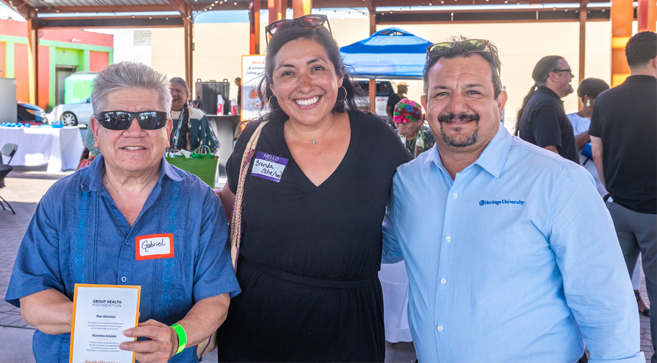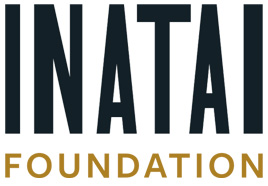Resources | Reports
Grantee Engagement Evaluation
Downloads
President & CEO Introductions
Report PDF

Photo: Ignacio Marquez, Gabriel Portugal (Tri-Cities LULAC), Brenda Anibarro (Inatai Foundation), and Martin Valadez (I’ll Lead) at our Pasco Office opening party.
Communities know best
Every day, community leaders across Washington work to build power for and within their communities. Inatai Foundation recognizes this expertise and the wisdom all communities possess. Since 2018, we have been honored to fund organizations and projects engaged in advocacy, leadership development, cultural reclamation, community healing, civic participation, organizing, antiracism work, narrative change, and so much more.
Getting to know and hear from community leaders will always be a priority. The guidance and feedback they provided led us to reset our values in 2022 to clearly state our commitment to racial justice.
This evaluation was another chance to hear about how we’re doing. Our partners at Frontline Solutions interviewed and surveyed more than 100 grantee organizations last year to better understand how well leaders feel our policies, processes, and practices align with our new values and how they experience working with us.
We are making these results public as a form of accountability to grantees, as a resource to our funder partners, and as a promise that our team welcomes feedback, stories, insights, and reflections any time.
We hosted a webinar to provide an opportunity to dig deeper and expand on the findings of the report. A video of the webinar is available in both English and Spanish.
Key Findings
Inatai puts grantees first
- 92 percent of multi-year respondents agree that Inatai’s relationship model prioritizes equity, power building, transparency, and mutual trust.
Inatai lives our values through action
- 96 percent of multi-year grantees say Inatai commitment to racial justice is clear in how team members show up for grantees.
- Black and Native leaders and those in larger cities were slightly less likely to agree.
Inatai positively affects power-building in communities
- One 501(c)(4) grantee reported, “The grant helped [us] go from having zero staff to six staff who now have c4 deliverables in their work plan. This includes our first ever Political Director.”
- 89 percent of majority-BIPOC-led organizations requested additional networking opportunities.
Inatai is in learning mode…and has more to learn
- Inatai Board members and staff continue to look for ways to build skills internally to maximize the foundation’s external impact. Skills included power-building, power-sharing, and conflict resolution.
Inatai can change philanthropy for the better
- One grantee said, “[Inatai] can challenge other foundations…to rethink their giving structures. Given the size of the foundation, they could really be leading culture change.”
Q&A
How were grantees selected to be a part of the evaluation and how did you ensure you heard from a sample of grantees that reflects the demographics of all the organizations that Inatai funds?
Inatai provided our evaluation partner, Frontline Solutions, with grantee contact information for organizations that we had funded for one or more years. Frontline Solutions invited grantees to take part in the survey. Survey participation was optional and included collecting demographic information at the organizational level (for example, identities held by organizations leadership). Demographic information was used to determine if the sample of survey responses reflected overall grantee demographics.
For the interviews, Inatai provided demographic information of organizational leadership for each grantee so Frontline Solutions could select which groups to invite for an interview. Together, we prioritized ensuring robust representation from organizations led by BIPOC, LGBTQ+, tribal nations, and a mix of rural, mid-sized cities and urban based organizations. This meant extending the data collection period to gather enough responses to learn how a broad range of communities experience Inatai differently.
How were responses or the identity of those completing surveys or interviews kept anonymous?
Frontline Solutions collected the data, scheduled, and carried out the interviews separate from the Inatai team. Frontline provided updates on the number of surveys and interviews completed during the data collection phase and kept confidential information on which grantees took part in the surveys and interviews.
Were grantees compensated for completing surveys and interviews?
Yes, we strongly believe in compensating leaders and organizations for their time. Organizations that completed the survey received $150 and organizations that completed the interviews received $250.
Who designed the evaluation? Have you considered co-designing evaluations with grantees?
For this first effort, we worked closely with Frontline to co-design the evaluation. We plan to co-design future evaluations with grantees. We believe firmly in an assessment approach that measures what organizations are hoping to learn and brings in leaders and organizations as co-designers in that process.
Does Inatai have any intentions of doing a perception survey of non-grantees? By the nature of receiving money from the foundation, grantees may have their own bias.
We believe it is essential to assess how the people to whom we are accountable, especially grantee organizations, experience our team and work. We welcome feedback from our colleagues in philanthropy, and we are clear on being accountable to the organizations who are building community power and working for racial justice across the state. From an evaluation design perspective we worked to address the power dynamic and bias by ensuring the evaluation was anonymous.
When will the next evaluation report be released?
We plan to share an external evaluation report every five years. Our work is informed by listening sessions and feedback from communities to whom we are accountable through community engagement, convenings and meetings each year. Our external evaluation creates an additional channel for anonymous feedback and provides a framework for reflection, learning, and growth across Inatai Foundation.
